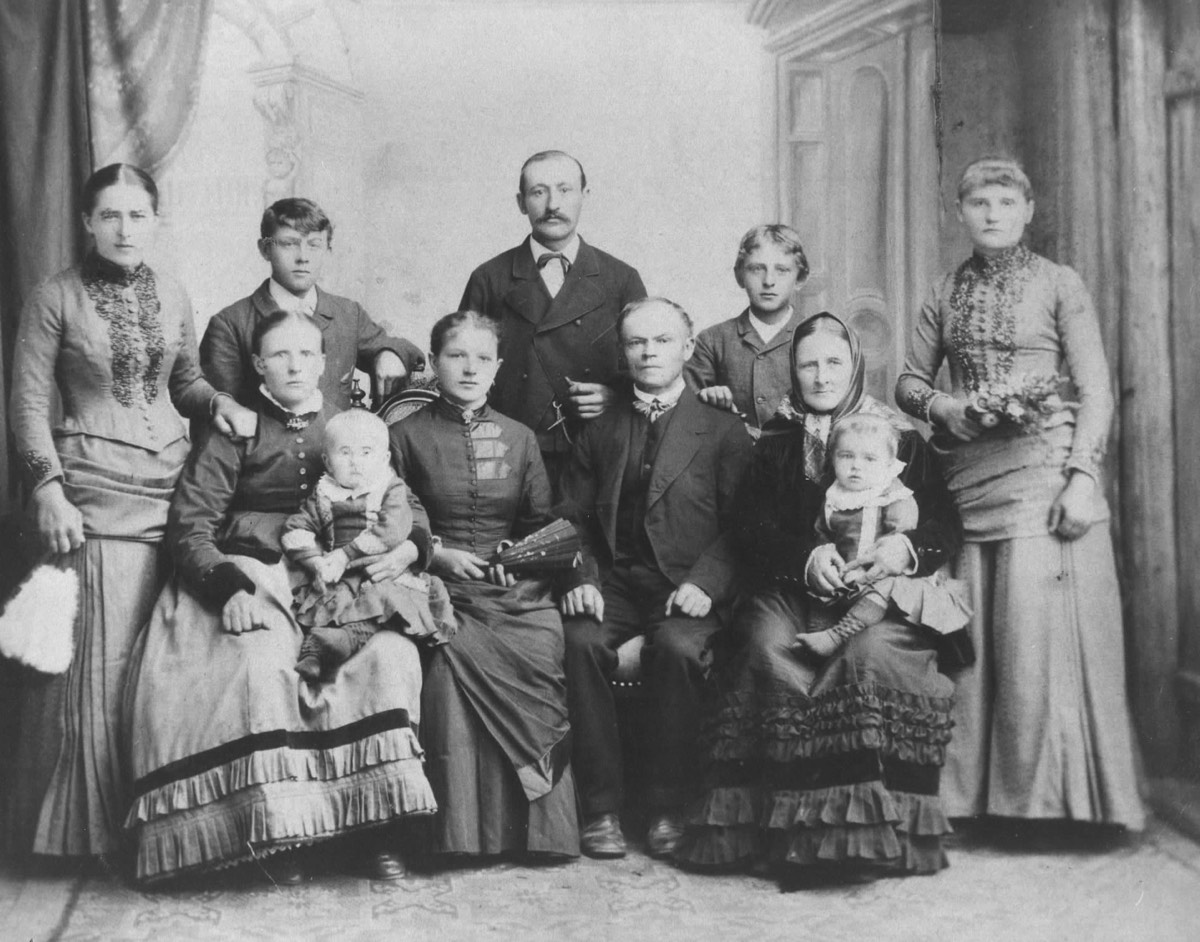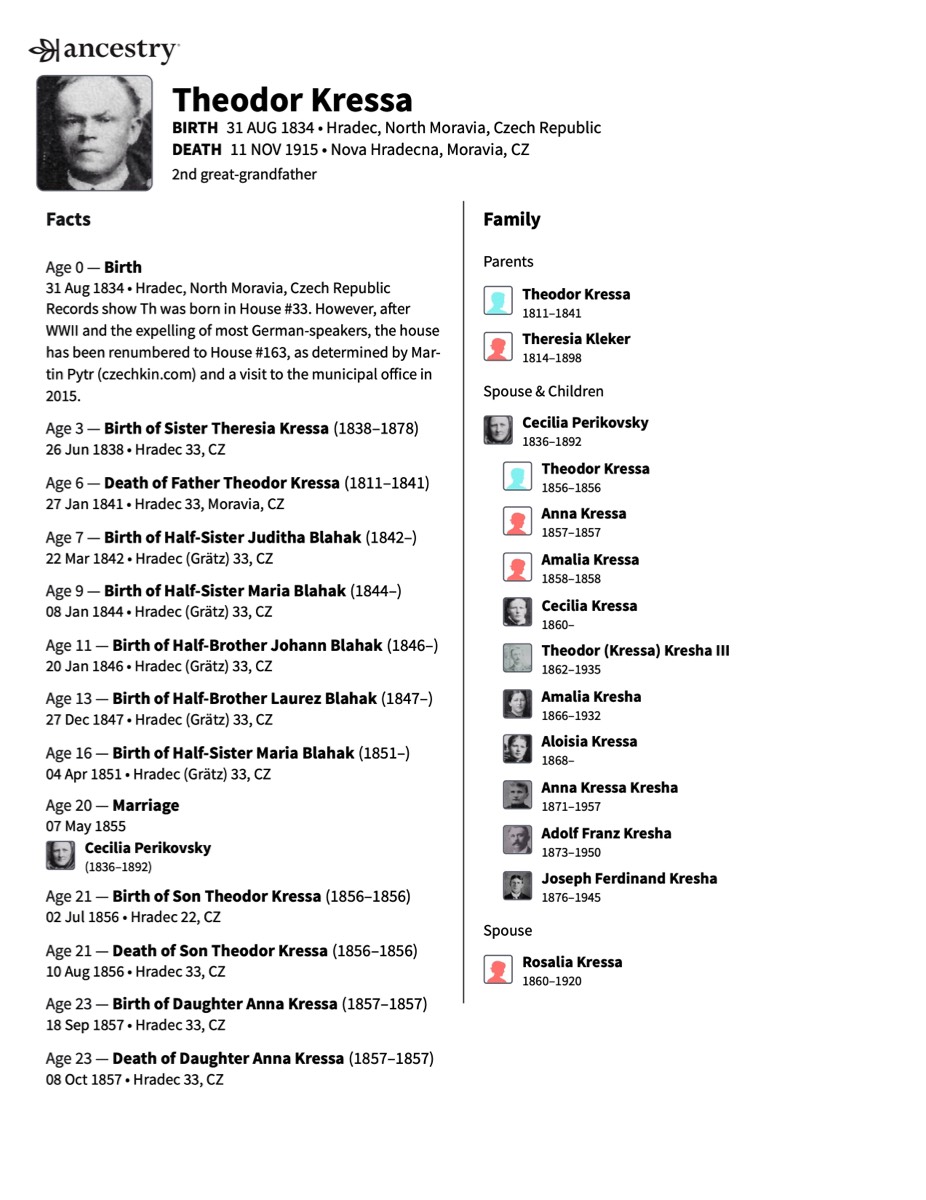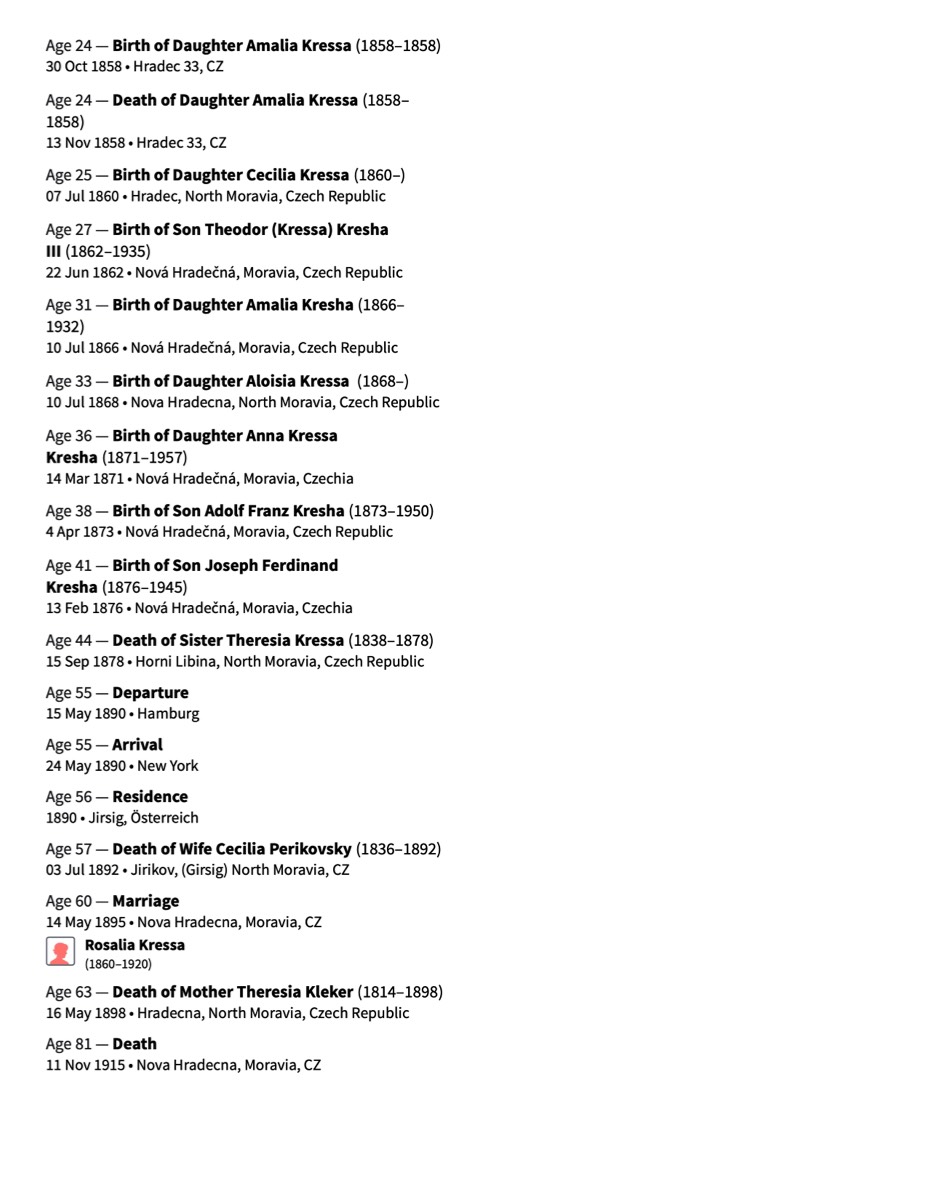The Kressas: Theodor II and Cecilia

Photo taken in Girsig/Jirikov, Moravia, Czechia about 1887. Back row: left to right: Amelia "Molly" Kressa Kuhnel, Adolf Kressa, John Thiele, Joseph Kressa, Anne Kressa Karges. Front row, left to right: Cecilia Kressa Scholz Thiele (holding Franz Joseph Thiele), Aloisia Kressa Weixler, Theodor Kressa, wife Cecilia Girikovsky Kressa, holding Louis Kuhnel.
Theodor II Kressa was born in August 31,1834 in Hradec #33/163 in what is now called Nova Hradecna (Gratz, Markersdorf). (The word hradec means house or castle). His first wife was Cecilia Perikovsky, born October 22, 1836 in the nearby community of Nova Dedina (Schroffelsdf). They were married and lived in House #33 in Nova Hradecna. They had 10 children, but the first three died within a week or two of birth.
The first three children were named Theodor, Anna, and Amalia; when the other children were born, the names were ‘recyled’ and later children carried these family names. Theodor and Cecilia's children who lived into adulthood, were:
4. Cecilia (Kressa) Scholz Theil, born July 7, 1860. She married Robert Scholz in 1879. When Robert died of tuberculosis six years later, she married Johann Thiel in 1885, staying in Moravia. Family descendants were expelled to Germany in 1947. Further details unknown at this time.
5. Theodore (Kressa) Kresha, Jr. born June 22, 1862. Died 1938, New York, age 69. He never married.
6. Amalia (Kressa) Kuhnel, born July 7, 1866. She married Adolph Kuhnel in Moravia in 1887, then again on Dec. 31, 1889 in Colfax County, NE, died Aug 7, 1932 in Shelby, NE, age 66.
7. Aloisia (Kressa) Weixler, born July 7, 1868. She married Josef Weixler in 1896 and had one child, but her death place and date are unknown. Family descendants were expelled to Germany in 1947.
8. Anna (Kressa) Karges, born March 14, 187. She emigrated in 1888 and married Martin Karges, Sr. in 1890. She died in Shelby, NE in 1957, age 86.
9. Adolf Franz (Kressa) Kresha, born April 4, 1873. Died 1950, Polk County, Nebraska, age 76.
10. Joseph F. (Kressa) Kresha, born February 13, 1876. Died 1945 California, age 69.
The first three children were named Theodor, Anna, and Amalia; when the other children were born, the names were ‘recyled’ and later children carried these family names. Theodor and Cecilia's children who lived into adulthood, were:
4. Cecilia (Kressa) Scholz Theil, born July 7, 1860. She married Robert Scholz in 1879. When Robert died of tuberculosis six years later, she married Johann Thiel in 1885, staying in Moravia. Family descendants were expelled to Germany in 1947. Further details unknown at this time.
5. Theodore (Kressa) Kresha, Jr. born June 22, 1862. Died 1938, New York, age 69. He never married.
6. Amalia (Kressa) Kuhnel, born July 7, 1866. She married Adolph Kuhnel in Moravia in 1887, then again on Dec. 31, 1889 in Colfax County, NE, died Aug 7, 1932 in Shelby, NE, age 66.
7. Aloisia (Kressa) Weixler, born July 7, 1868. She married Josef Weixler in 1896 and had one child, but her death place and date are unknown. Family descendants were expelled to Germany in 1947.
8. Anna (Kressa) Karges, born March 14, 187. She emigrated in 1888 and married Martin Karges, Sr. in 1890. She died in Shelby, NE in 1957, age 86.
9. Adolf Franz (Kressa) Kresha, born April 4, 1873. Died 1950, Polk County, Nebraska, age 76.
10. Joseph F. (Kressa) Kresha, born February 13, 1876. Died 1945 California, age 69.
Theodor II, a man with a fiery temper, farmed the small 25-30 acre parcel of land behind house #33, all owned by Emperor Franz Joseph. The Emperor received one third of the proceeds, local officials got another third, and the family got to keep the remaining one third. Common crops included wheat, hops, sunflowers, hay, sugar beets, barley, rye, and grapes. It is not known exactly what crops Kressa grew.
Here are some stories from "The Kresha Family in America, 1888-1988.
"Farming with horses, Theodor had a violent temper. Once, when the horses refused to pull the plow, he became so angry that he left the horse in the middle of the field with the plow still in the ground. He walked home, "taking to his bed" to sulk." Cecilia had to walk to the field, calm the horses, and kindly coax them while she finished plowing the field herself."
"All the crops grown in Nebraska were grown in Moravia, except corn, which originated in the Americas. Moravian farmers also grew hops, sugar beets, barley, and rye - the necessary ingredients required to brew ale, the popular alcoholic beverage (6% alcohol). It was a sign of hospitality to offer "spirits" to your guests. "
...."The family had a few cows for milk, a few chickens to eat and provide eggs, and hogs for meat. Theodor and Cecilia butchered their own livestock, frying the pork and storing it in five gallon crocks after covering it with hot lard. They stuffed their own sausage and smoked it in the village [Hradec] smokehouse. The remaining carcass was shared with neighbors, relatives, and friends, who later returned the same amount of meat when they butchered.
"In the fall, the root crops were dug and stored in a pit near the foundation of the house, where frost and cold couldn't hurt them. In the pit were stored potatoes, beets, turnips, and carrots.
"Since the family liked sauerkraut, the Kressas made enough to last all year. That required a big cabbage patch, with the children providing the garden labor. Grapes were grown on the hillside behind the barn to make jellies and wine. Hops were grown on tall fences in the orchard [presumable for ale]. The Kressas had been farmers for many generations."
Adolf Kresha, as remembered by his daughter Vivian
Cecilia was a hard working woman who worked in a factory when the children were older, riding the train there every day. [There remains a train station in Hradecna to Unicov to this day.] She could make many things. When she arrived home in the evening, she'd have a bottle of liquor under her dress. In addition to the large family, she helped with the livestock and farming, as noted above.
Cecilia said that her sons weren't going to get killed in all the wars and as soon as they reached the age of 15, the Conscription Law age, she sent them to America, the Land of Freedom.
Cecilia said that her sons weren't going to get killed in all the wars and as soon as they reached the age of 15, the Conscription Law age, she sent them to America, the Land of Freedom.
Theodor and Cecilia crossed the ocean to visit their children in Nebraska one hot summer in August of 1890. They were accompanying their youngest son, Joseph, to the USA and were considering staying with the four other children who were already in the United States. However, they were not used to the temporary humidity and heat and spent most of their visit in the potato cellar where it was cool. They sat there all day, according to family stories. The children could not convince them the heat would pass and Theodor and Cecilia headed back to the "The Old Country." It is not sure where they went, as they had sold their home in Hradec around 1885 to move to Jirikov.
Cecilia died several years after their visit, about 1894.
Several years later, Theodor married a "widow lady with small children", as related by Eva Kresha, Theodor's son's second wife. Theodor himself died November 11, 1915 somewhere in Moravia. We have no information regarding the "second family or where Theodor lived and is buried.
Cecilia died several years after their visit, about 1894.
Several years later, Theodor married a "widow lady with small children", as related by Eva Kresha, Theodor's son's second wife. Theodor himself died November 11, 1915 somewhere in Moravia. We have no information regarding the "second family or where Theodor lived and is buried.


